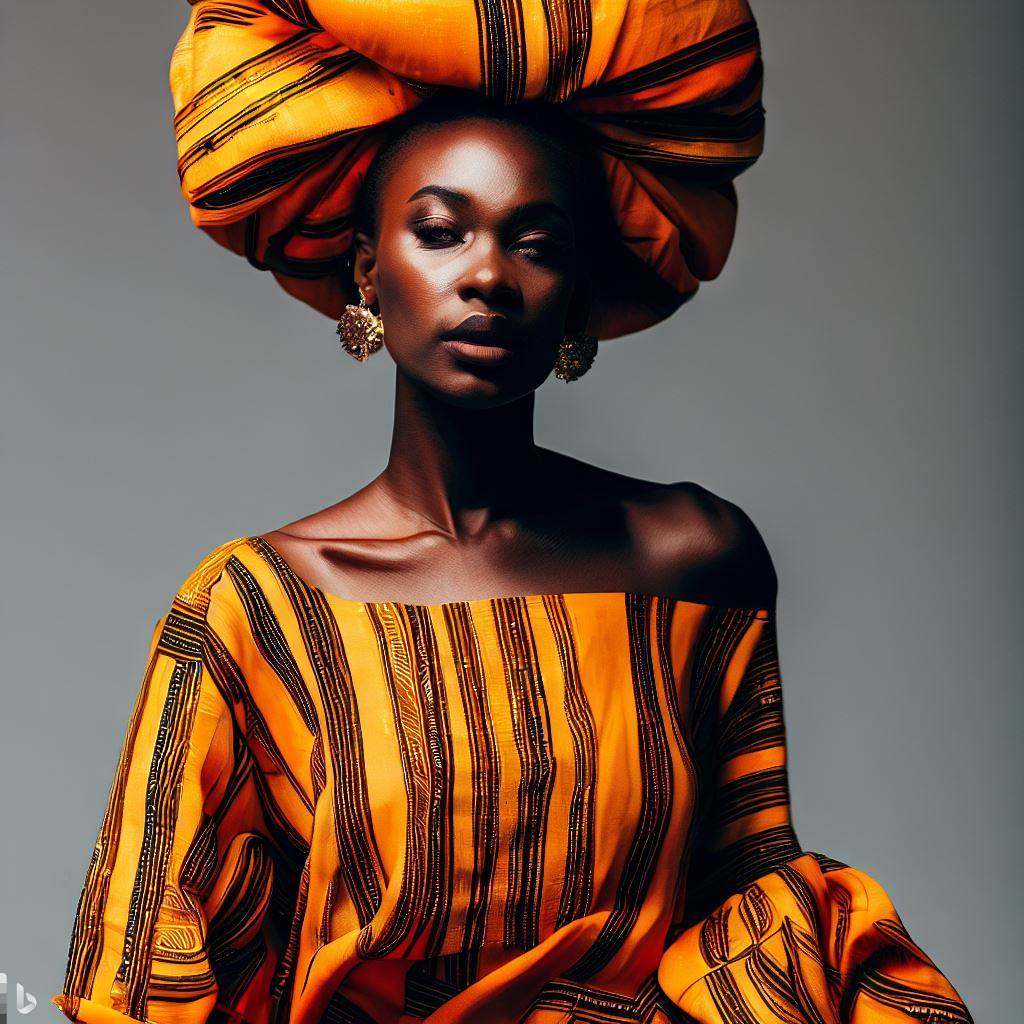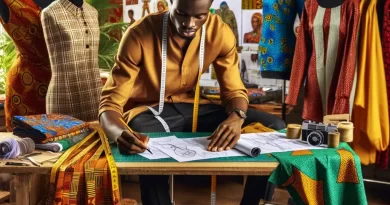The Role of Culture in Nigerian Fashion Design Industry
Last Updated on January 26, 2024
Introduction
Let’s explore the role of culture in Nigerian Fashion design industry.
The Nigerian fashion design industry is thriving and gaining global recognition.
Culture plays a pivotal role in Nigerian fashion, showcasing the country’s rich heritage.
This blog post aims to explore the significance of culture in the Nigerian fashion design industry.
Historical Background of Nigerian Fashion Design Industry
In this section, we will explore the historical background of the Nigerian fashion design industry.
A. Influence of traditional Nigerian clothing
- The Nigerian fashion design industry has deep roots in the country’s rich cultural heritage.
- Traditional Nigerian clothing, with its vibrant colors and intricate patterns, has long been a source of inspiration for designers.
- These traditional garments, such as the Aso-Oke and Ankara prints, have become iconic symbols of Nigerian fashion.
- They are not only worn on special occasions but are also incorporated into modern designs.
B. Emergence of fashion designers in Nigeria
- In the 1950s and 1960s, Nigeria witnessed the rise of local fashion designers.
- These designers began creating contemporary clothing that blended traditional elements with modern aesthetics.
- They aimed to celebrate Nigerian culture and promote it through fashion.
- Many fashion shows and events were organized to showcase the talent and creativity of these designers.
C. Impact of globalization on the industry
- With the advent of globalization, the Nigerian fashion design industry experienced a significant transformation.
- Designers started to experiment with different fabrics, styles, and techniques from around the world.
- This fusion of global influences with Nigerian culture gave birth to a unique and diverse fashion scene.
- The industry gained international recognition, attracting both local and international customers.
- Nigerian fashion designers began showcasing their collections at major fashion events and gaining global acclaim.
Therefore, the historical background of the Nigerian fashion design industry demonstrates its deep connection with the country’s culture and traditions.
The influence of traditional Nigerian clothing, the emergence of local designers, and the impact of globalization have all played significant roles in shaping the industry.
Today, Nigerian fashion design is celebrated for its fusion of traditional and contemporary styles, making it a vibrant and dynamic sector in the global fashion landscape.
Read: Education for Fashion Designers in Nigeria: What You Need
Cultural Influences in Nigerian Fashion Design
A. Ethnic groups and their unique fashion styles
- The diverse ethnic groups in Nigeria contribute to a rich tapestry of fashion.
- Each ethnic group has its own distinct traditional attire and fashion customs.
- For example, the Yoruba people are known for their vibrant and colorful clothing.
B. Traditional fabrics and patterns
- Nigerian fashion designers utilize traditional fabrics like adire, aso oke, and ankara.
- These fabrics are adorned with intricate patterns and motifs that reflect cultural heritage.
- Traditional Nigerian textiles have gained international recognition and are now worn worldwide.
C. Symbolism and significance of Nigerian fashion
- Nigerian fashion goes beyond aesthetics; it carries profound symbolism and cultural significance.
- Each fabric pattern and design holds symbolic meaning, representing ideas, values, and history.
- Wearing traditional Nigerian attire is a way of expressing pride in cultural heritage.
D. Preservation and modernization of cultural elements
- Nigerian fashion designers play a crucial role in preserving and modernizing cultural elements.
- They fuse traditional and contemporary styles to create unique and innovative designs.
- This fusion helps in promoting cultural heritage while appealing to a global audience.
Nigerian fashion design is heavily influenced by the country’s diverse cultural landscape.
The various ethnic groups in Nigeria contribute to a vibrant fashion industry that showcases unique styles and customs.
One of the key aspects of Nigerian fashion design is the influence of different ethnic groups.
Each ethnic group has its own distinctive fashion style, ranging from attire to accessories.
For instance, the Yoruba people are known for their colorful and vibrant clothing, often adorned with intricate embroidery and beadwork.
Traditional fabrics and patterns also play a significant role in Nigerian fashion design.
Nigerian designers frequently incorporate traditional fabrics such as adire, aso oke, and ankara into their creations.
These fabrics are renowned for their bold prints and vibrant colors, capturing the essence of Nigerian culture and heritage.
Moreover, Nigerian fashion goes beyond aesthetics; it carries deep symbolism and cultural significance.
Each fabric pattern and design hold symbolic meaning, representing ideas, values, and even historical events.
Wearing traditional Nigerian attire is a way of expressing pride in one’s cultural heritage and connecting with traditions that span generations.
While preserving cultural elements is important, Nigerian fashion designers also embrace modernization.
They skillfully blend traditional and contemporary styles to create unique and innovative designs.
This fusion enables Nigerian fashion to captivate both local and international markets, fostering a sense of pride and recognition for Nigerian culture worldwide.
Basically, culture plays a pivotal role in the Nigerian fashion design industry.
Ethnic groups and their unique fashion styles, traditional fabrics and patterns, symbolism and significance, as well as the preservation and modernization of cultural elements, all contribute to the richness and diversity of Nigerian fashion.
By celebrating cultural heritage while embracing innovation, Nigerian fashion designers continue to shape the industry and showcase Nigeria’s creativity to the world.
Read: Nigeria’s Animation Industry: Past, Present, Future
Nigerian Fashion Designers and Cultural Expression
A. Prominent Nigerian fashion designers and their styles
- Deola Sagoe: Known for her unique blend of traditional Nigerian fabrics with modern silhouettes.
- Lisa Folawiyo: Famous for her innovative use of Ankara fabric and intricate embellishments.
- Mai Atafo: Recognized for his sharp tailoring and fusion of traditional Nigerian attire with Western influences.
- Tiffany Amber: Renowned for her elegant and sophisticated designs that showcase Nigerian aesthetics.
- Lanre Da Silva Ajayi: Known for her artistic approach to fashion, combining traditional African prints with contemporary styles.
B. Fusion of traditional and contemporary fashion elements
Nigerian fashion designers have successfully merged traditional and contemporary fashion elements to create unique and innovative designs.
By incorporating traditional Nigerian textiles, such as Ankara, Adire, and Aso Oke, into modern silhouettes, they have brought a fresh perspective to the fashion industry.
This fusion allows them to honor their cultural heritage while embracing global fashion trends.
C. Incorporation of Nigerian cultural motifs and designs
Nigerian fashion designers embrace their cultural heritage by incorporating Nigerian cultural motifs and designs into their creations.
These motifs include traditional patterns, symbols, and prints that reflect the rich cultural diversity of Nigeria.
By incorporating these elements, designers not only celebrate their roots but also promote Nigerian culture on the global stage.
The use of traditional Nigerian fabrics, such as Ankara and Adire, is a common practice among Nigerian fashion designers.
These fabrics are characterized by vibrant colors and bold patterns, which reflect the traditional aesthetics of the Nigerian people.
Designers creatively incorporate these fabrics into their designs, whether it’s in the form of dresses, skirts, or accessories, to give them a distinct Nigerian identity.
In addition to fabrics, Nigerian fashion designers also draw inspiration from traditional Nigerian attire.
They skillfully incorporate elements such as the Buba, Gele, Agbada, and Kaftan into their designs, giving them a modern twist.
By blending these traditional garments with contemporary styles, designers cater to the needs of both local and international clientele, offering them a unique and culturally enriched fashion experience.
Moreover, Nigerian fashion designers often collaborate with local artisans and craftsmen to create garments and accessories that showcase traditional Nigerian techniques.
This collaboration not only preserves traditional craftsmanship but also provides employment opportunities for local artisans.
By infusing their designs with Nigerian cultural motifs, designers create pieces that are not only fashionable but also contribute to the empowerment of local communities.
In short, Nigerian fashion designers play a crucial role in expressing Nigerian culture through their innovative designs.
They showcase the fusion of traditional and contemporary elements, incorporate Nigerian cultural motifs and designs, and collaborate with local artisans to create fashion pieces that reflect the richness of Nigerian culture.
Through their creativity and craftsmanship, Nigerian fashion designers have put Nigerian fashion on the global map, making it an integral part of the global fashion industry.
Read: The Role of Public Relations Specialists in Nigeria Today

Cultural Challenges and Opportunities in Nigerian Fashion Design
A. Balancing tradition and modernity
- Nigerian fashion designers face the challenge of preserving cultural heritage while embracing modern trends.
- They must find a balance between traditional attire and contemporary styles to appeal to a wider audience.
- Incorporating traditional Nigerian prints, fabrics, and techniques into modern designs can attract both local and international customers.
- By infusing modern elements into traditional clothing, Nigerian fashion designers create unique and innovative pieces that reflect their cultural roots.
B. Coping with Westernization and globalization
- The Nigerian fashion industry must adapt to the influences of Western fashion and globalization.
- Western brands and trends can sometimes overshadow local designers, making it harder for them to gain recognition.
- However, Nigerian fashion designers have the opportunity to blend global influences with their cultural identity, creating fusion designs that are distinctively Nigerian.
- Local fashion weeks and events provide platforms for Nigerian designers to showcase their talent and stand out in the global fashion arena.
C. Economic benefits and opportunities for cultural exchange
- The Nigerian fashion industry contributes to the country’s economy through job creation, export revenue, and tourism.
- By promoting local designs and craftsmanship, the fashion industry supports small businesses and empowers local artisans.
- Cultural exchange occurs through collaborations between Nigerian designers and international fashion houses, leading to the exchange of ideas and skills.
- Nigerian fashion designers have the opportunity to showcase their cultural heritage and challenge stereotypes through their clothing, promoting diversity and inclusivity.
D. Promoting Nigerian fashion internationally
- Nigerian fashion designers are harnessing the power of social media and online platforms to showcase their work to a global audience.
- International collaborations and fashion shows provide Nigerian designers with exposure and access to international markets.
- The Nigerian government and industry associations play a crucial role in promoting Nigerian fashion on the global stage.
- Fashion events like the Lagos Fashion Week attract international buyers, journalists, and influencers, putting Nigerian fashion on the map.
In review, the Nigerian fashion design industry faces various cultural challenges and opportunities.
Balancing tradition and modernity, coping with Westernization and globalization, and promoting cultural exchange are key factors for its growth.
By embracing their cultural heritage, Nigerian fashion designers can create unique designs that resonate both locally and internationally.
Through economic benefits and international collaborations, the industry has the potential to contribute significantly to Nigeria’s economy and cultural diversity.
Read: Comparison: TV Editor Roles in Nigeria Vs. Globally
You Might Also Like: Case Study: Influential Nigerian Costume Designers’ Journey
Impact of Cultural Preservation in the Fashion Industry
In Nigeria, cultural preservation plays a significant role in shaping the country’s fashion design industry.
By embracing and incorporating traditional elements into contemporary fashion, Nigerian designers have managed to create a unique identity that sets them apart from the rest of the world.
A. Contribution to national identity and pride
The preservation of Nigerian culture in the fashion industry contributes to the nation’s identity and fosters a sense of pride among its people.
Traditional fabrics, patterns, and designs are powerful symbols of cultural heritage, reminding Nigerians of their roots and heritage.
Through the use of indigenous textiles such as adire, ankara, and aso-oke, Nigerian fashion designers showcase their rich cultural heritage.
This promotes a sense of belonging and strengthens national identity, as people can identify themselves through the clothes they wear.
Nigerian fashion shows and events also celebrate cultural diversity, highlighting the beauty of traditional attire from various regions of the country.
This not only educates the younger generation about their heritage but also showcases Nigeria’s cultural richness to the rest of the world.
B. Empowerment of local artisans and craftsmen
The preservation of culture in the Nigerian fashion design industry empowers local artisans and craftsmen.
Traditional techniques, passed down through generations, are kept alive and valued in the production of unique and authentic pieces.
By incorporating traditional craftsmanship, Nigerian fashion designers support local artisans, helping them sustain their livelihoods.
These artisans specialize in techniques such as weaving, dyeing, embroidery, and beadwork, which are integral to the creation of traditional garments and accessories.
Through collaboration with local craftsmen, designers are able to create employment opportunities and provide consistent work to skilled individuals.
This empowers them financially and enhances their confidence in preserving their cultural heritage.
C. Boost to the Nigerian economy through tourism and exports
The preservation of culture in the fashion industry also contributes to the Nigerian economy through tourism and exports.
Nigeria’s rich cultural heritage attracts both local and international tourists, who are eager to experience its vibrant traditional fashion.
International recognition of Nigerian fashion designers has led to increased demand for their products globally.
Nigerian fashion brands are now showcased on international runways and worn by celebrities, which further boosts the country’s reputation and stimulates economic growth.
Additionally, the export of Nigerian traditional fabrics and garments helps generate foreign exchange earnings for the country.
The global market’s interest in African-inspired fashion provides lucrative opportunities for Nigerian designers, who can leverage their cultural assets to expand their businesses and contribute to the national economy.
In summary, the impact of cultural preservation in the Nigerian fashion design industry cannot be underestimated.
It contributes to national identity and pride, empowers local artisans, and boosts the Nigerian economy through tourism and exports.
By embracing their cultural heritage, Nigerian fashion designers have positioned themselves as pioneers in the global fashion industry, while also nurturing a sense of belonging and pride among their people.
Future Prospects and Growth of Nigerian Fashion Design
A. Emerging trends and innovations
- Introduction of sustainable and eco-friendly materials in fashion design.
- Blend of traditional Nigerian fabrics with modern designs to cater to a global market.
- Incorporation of technology, such as 3D printing and digital design, into Nigerian fashion.
- Exploration of unconventional shapes and silhouettes to challenge traditional notions of fashion.
- Experimentation with bold colors and patterns to showcase Nigerian cultural heritage.
B. Collaboration between designers and cultural institutions
- Partnerships with museums and cultural centers to showcase Nigerian fashion designs.
- Collaboration with local artisans and craftsmen to promote traditional techniques and skills.
- Exchange programs with international fashion institutions to foster cross-cultural creativity.
- Fashion exhibitions and shows organized by cultural institutions to bring exposure to designers.
- Workshops and mentorship programs facilitated by cultural institutions to support emerging designers.
C. Government support and initiatives for the industry
- Establishment of fashion training institutes and academies to provide formal education for aspiring designers.
- Financial support and grants for small-scale fashion entrepreneurs to start their own businesses.
- Implementation of policies and regulations to protect intellectual property rights of designers.
- Inclusion of Nigerian fashion in government-sponsored events and delegations to promote the industry internationally.
- Collaboration between government and fashion industry stakeholders to create favorable business environments.
Generally, the Nigerian fashion design industry has promising future prospects and potential for growth.
Through emerging trends and innovations, collaboration with cultural institutions, and government support and initiatives, the industry can continue to thrive and contribute to the Nigerian economy while preserving its rich cultural heritage.
By embracing these opportunities, Nigerian fashion designers can gain recognition on the global stage and inspire future generations of creatives.
Conclusion
Culture plays a vital role in the Nigerian fashion design industry. It serves as a source of inspiration, influencing the design aesthetics and techniques used by Nigerian fashion designers.
With traditional Nigerian clothing styles and textiles being integrated into modern fashion trends, the industry showcases the unique cultural heritage of the country.
Furthermore, supporting and appreciating Nigerian fashion designers is crucial in promoting their talent and boosting the industry.
By purchasing locally made designs and encouraging sustainable fashion practices, individuals can contribute to the growth and success of Nigerian fashion.
Lastly, the diversity and richness of Nigerian fashion cannot be overlooked. The country’s diverse ethnic groups and their distinct clothing traditions contribute to a vibrant and dynamic fashion scene.
Nigerian fashion designers continually innovate and create captivating designs that celebrate the country’s cultural heritage.
Overall, the Nigerian fashion design industry thrives on the fusion of culture, creativity, and innovation.
By recognizing its significance, supporting local designers, and embracing the diversity it offers, we can contribute to the continued growth and success of Nigerian fashion on a global scale.


